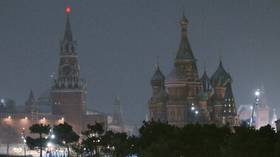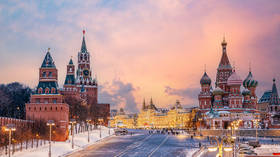Polls close in Israel: Historic snap election a referendum on Netanyahu & settlement annexations
Israelis have finished voting for the second time this year. The already unprecedented general election is also the culmination of an existential drama for PM Benjamin Netanyahu and the Israeli-Palestinian peace process.
Having already secured Washington’s backing for the Israeli claims to the Golan Heights and Jerusalem, Netanyahu had to up the stakes, vowing on the eve of the vote to annex Hebron as well as the Israeli settlements in the Jordan Valley, if elected.
This may be a step farther than his main challenger, Benjamin ‘Benny’ Gantz of the Kahol Lavan (Blue and White) bloc is ready to take. However, Gantz himself is no dove, having overseen the 2012 and 2014 onslaughts against Gaza as chief of the general staff of the Israel Defense Forces.
Also on rt.com Netanyahu says he will annex Jewish settlements in Hebron if re-electedMeanwhile, US President Donald Trump is holding back his “deal of the century” peace plan pending the outcome of the election, with the clear implication that he is basing it on Netanyahu staying in power. Netanyahu, 69, is already the longest-serving prime minister in Israeli history, having held the reins of power for a total of 13 years so far: from 1996 to 1999, and then since 2009.
The election itself is a result of a failure to form a government following the vote in April, in which Netanyahu’s Likud Party and Blue and White were tied at 35 Knesset seats each, with smaller parties dividing the remaining 50. Neither managed to attract enough smaller parties to reach the bare minimum of 61 seats needed for a government, however, as conflict between the ultra-religious Haredim and the nationalist settlers scuttled coalition talks.
Five months later, the divisions are no less pronounced. With the once-dominant Labor party in free-fall since 2001, the majority of Israeli parties are on the right spectrum, but that only means the campaign has been divisive, intensely personal, and focusing on the tyranny of small differences.
“This is a vote about who Israelis want to be,” Professor Moshe Maoz of Hebrew University in Jerusalem told USA Today. Herb Keinon of the Jerusalem Post has described the campaign as “not about being for anything, only about what you are against.”
Also on rt.com ‘Netanyahu goes to Putin to show Israeli voters: ‘I’m an important world leader’Yisrael Beytenu Party, led by the secular ‘Russian’ settler Avigdor Lieberman, has insisted on conscription applying to the ultra-religious Jews, who are currently exempt. The religious Shas party has pleaded with voters to support them or face “a tragedy of generations.”
If Netanyahu has to rely on Lieberman to make a government, Shas leader Arye Deri proclaimed, “It will be observers of religious tradition and Judaism out, eaters of pork and the tramplers of Shabbat in.”
#IsraElex19v2: The initial results have placed #YisraelBeytenu leader, Avigdor #Liberman, as the #kingmaker of this #election. Party officials have said they intend to push for a #UnityGovernment between #Likud and #BlueAndWhite.
— Paula Slier (@PaulaSlier_RT) September 17, 2019
That’s not even talking about the opposition, where among the policies championed by Blue and White are civil marriages – still illegal in Israel – and allowing public transportation to function on Shabbat.
Gantz and his junior partner in Blue and White, former finance minister Yair Lapid, have left open the possibility of forming a “national unity” government with Likud – but only if Netanyahu has no part in it. However, it is hard to imagine Likud would turn on its leader, unless the party badly backslides in the polls.
Also on rt.com ‘Netanyahu’s Jordan Valley annexation pledge is PR stunt to deflect attention from corruption woes’Ultimately, this election is a referendum on Netanyahu, or “To Bibi or not to Bibi,” as Jerusalem Post editor-in-chief Yaakov Katz put it. According to Katz, the PM’s critics are arguing that his rhetoric is “divisive and polarizing and has alienated Diaspora Jewry, the US’s Democratic Party and large swathes of Israel’s nine million citizens.”
Like this story? Share it with a friend!














